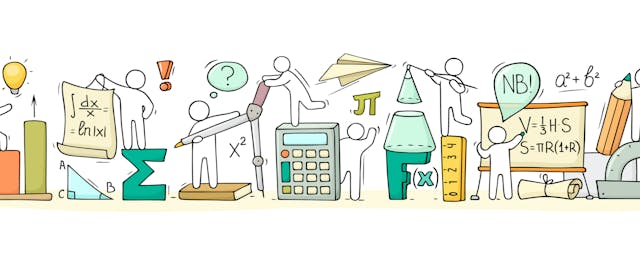Over a decade ago, I learned about a pioneering course at Cabrillo College in California. In it, students collected survey data in their neighborhoods on issues such as youth gangs or discrimination against immigrants, learned statistical methods to analyze that data, and presented their findings to their local community.
This social justice approach struck me as an effective and relevant way to teach mathematical concepts. The only problem? The community college’s math department didn’t consider it a math course. Although statistics was an accepted general education math course at institutions around the state, and the class used a valid inquiry-based pedagogical strategy, the math faculty nevertheless felt that the course needed to cover more algebra.
They weren’t exactly wrong: At the time, state policies required California community college students seeking to transfer to four-year universities to pass a college-level math course with an intermediate algebra (or Algebra 2) prerequisite. This was true regardless of whether they were pursuing an algebra-intensive major like engineering or physics, or a field like communications, counseling, or political science that doesn’t rely on algebra.
Fortunately, much has changed since then in California and elsewhere, paving the way to modernizing mathematics education. Instead of the one-size-fits-all math pathway that leads to Calculus and STEM majors, postsecondary education systems around the country are diversifying pathways to include courses—like statistics, data science, and quantitative reasoning—that better align with many students’ fields of interest. And that opens the door for courses that use mathematical concepts to examine public policy and social justice issues, whether policing, access to health care, or political representation.
These shifts, in turn, make room for new K-12 math content aimed at building the quantitative skills students need to examine issues relevant to their lives and their communities. The Common Core math standards incorporate a new emphasis on statistics as well as on using mathematics tomodel real-world problems. But math educators indicate that these topics often get short shrift. Data science courses that teach basic coding along with statistical skills are a novel and engaging way to address those standards. Unlike traditional math courses that focus on formulas and procedures, they are centered on real-world data.
In fact, if the ability to “understand and critique the world” is one of the primary purposes of math education, as the National Council of Teachers of Mathematics claims, data science needs to play a central role.
And that is exactly what has started to happen:
• In higher education, college students are flocking to data science courses. Take Foundations of Data Science, a five-year-old course at the University of California at Berkeley: It’s a mix of inferential thinking (including statistics), computational thinking (computer science), and real-world relevance. And it meets the campus undergraduate math requirement. By its second year, more than 1,000 students were enrolling in the course, making it the fastest-growing course in campus history. Berkeley also offers connector courses linked to specific disciplines that use real-world data to examine topics like race and policing, child development, and human migration.
• Opportunities to teach data science at the high school level are also opening up. In California, for example, 17 school districts have adopted an introduction to data science course that was conceived by faculty at UCLA and initially piloted by Los Angeles Unified School District. Students in the course collect data from their own lives—about their snacking or sleep habits, for example—and learn the programming language R to analyze the patterns. The course’s initial development was supported by the National Science Foundation. It also meets requirements for admission to California public universities, a key explanation for its rapid growth. It is also being replicated by high schools in three other states. In Georgia, mathematics and computer science instructors are also developing a two-course high school data science sequence that they hope to make available in that state by next fall.
These developments are helping to reinforce the notion that learning to analyze data to answer real-world questions or address social issues is a rigorous and relevant educational pursuit. And to detractors who worry that it won’t position students for college success, there is evidence to suggest otherwise: Research at the City University of New York found that college students who took introductory statistics courses were just as likely to pass advanced math courses as students who had taken a required algebra course. Other evidence shows the potential for social justice-oriented math curriculum to support math learning.
This momentum doesn’t automatically guarantee a place in the curriculum for data science or statistics. High school math sequences, in particular, are already quite crowded. But, as National Council of Teachers of Mathematics leaders have noted, those sequences include a lot of “obsolete legacy content.” And scholars from leading universities blame the traditional emphasis on algebra and geometry content for leaving U.S. students “woefully underprepared for the modern world.”
Some of that traditional content might follow the slide rule and the abacus into extinction. That would be a worthy sacrifice for ensuring students understand concepts like correlation and causality and know how to analyze data on spreadsheets. Most importantly, it would help ensure learners become 21st-century critical thinkers.


